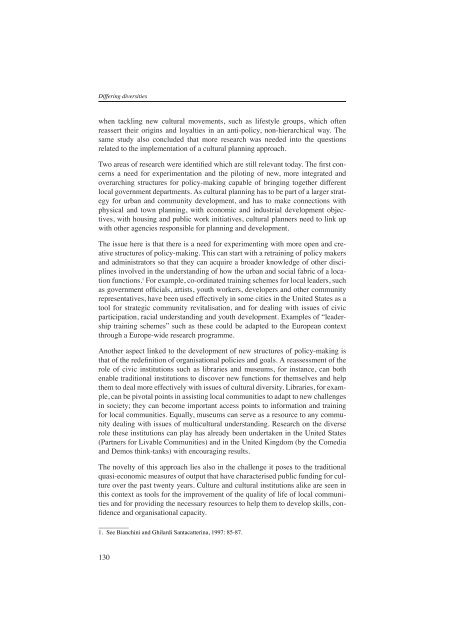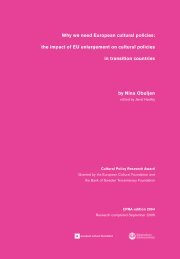<strong>Differing</strong> <strong>diversities</strong>when tackling new cultural movements, such as lifestyle groups, which <strong>of</strong>tenreassert their origins and loyalties in an anti-policy, non-hierarchical way. Thesame study also concluded that more research was needed into the questionsrelated to the implementation <strong>of</strong> a cultural planning approach.Two areas <strong>of</strong> research were identified which are still relevant today. The first concernsa need for experimentation and the piloting <strong>of</strong> new, more integrated andoverarching structures for policy-making capable <strong>of</strong> bringing together differentlocal government departments. As cultural planning has to be part <strong>of</strong> a larger strategyfor urban and community development, and has to make connections withphysical and town planning, with economic and industrial development objectives,with housing and public work initiatives, cultural planners need to link upwith other agencies responsible for planning and development.The issue here is that there is a need for experimenting with more open and creativestructures <strong>of</strong> policy-making. This can start with a retraining <strong>of</strong> policy makersand administrators so that they can acquire a broader knowledge <strong>of</strong> other disciplinesinvolved in the understanding <strong>of</strong> how the urban and social fabric <strong>of</strong> a locationfunctions. 1 For example, co-ordinated training schemes for local leaders, suchas government <strong>of</strong>ficials, artists, youth workers, developers and other communityrepresentatives, have been used effectively in some cities in the United States as atool for strategic community revitalisation, and for dealing with issues <strong>of</strong> civicparticipation, racial understanding and youth development. Examples <strong>of</strong> “leadershiptraining schemes” such as these could be adapted to the <strong>Europe</strong>an contextthrough a <strong>Europe</strong>-wide research programme.Another aspect linked to the development <strong>of</strong> new structures <strong>of</strong> policy-making isthat <strong>of</strong> the redefinition <strong>of</strong> organisational policies and goals. A reassessment <strong>of</strong> therole <strong>of</strong> civic institutions such as libraries and museums, for instance, can bothenable traditional institutions to discover new functions for themselves and helpthem to deal more effectively with issues <strong>of</strong> cultural diversity. Libraries, for example,can be pivotal points in assisting local communities to adapt to new challengesin society; they can become important access points to information and trainingfor local communities. Equally, museums can serve as a resource to any communitydealing with issues <strong>of</strong> multicultural understanding. Research on the diverserole these institutions can play has already been undertaken in the United States(Partners for Livable Communities) and in the United Kingdom (by the Comediaand Demos think-tanks) with encouraging results.The novelty <strong>of</strong> this approach lies also in the challenge it poses to the traditionalquasi-economic measures <strong>of</strong> output that have characterised public funding for cultureover the past twenty years. Culture and cultural institutions alike are seen inthis context as tools for the improvement <strong>of</strong> the quality <strong>of</strong> life <strong>of</strong> local communitiesand for providing the necessary resources to help them to develop skills, confidenceand organisational capacity.__________1. See Bianchini and Ghilardi Santacatterina, 1997: 85-87.130
Reasearch position paper 4On this last point, however, a word <strong>of</strong> caution concerning the evaluation <strong>of</strong> the“social impact” <strong>of</strong> arts-related initiatives needs to be introduced. In the past fiveyears, particularly in the United Kingdom, cultural development agencies haveincreasingly engaged in the debate around the development <strong>of</strong> more subtle andcreative ways <strong>of</strong> showing how quality <strong>of</strong> life can be improved through integrated,people-centred cultural activity. As a consequence, evaluation exercises have beencarried out focusing mostly on the positive effects that participation in arts-relatedactivities can have in dealing with cultural diversity; but the research underpinningthese evaluation exercises <strong>of</strong>ten tends to confuse indicators with “desirable outcomes”thus creating an obvious research bias (Matarasso, 1997).The issue here is that although there is a case to be made for advocating the importance<strong>of</strong> arts and cultural activities in generating equal participation and in fosteringcitizenship (as shown above in the Australian and American examples <strong>of</strong> culturalplanning), there is also a need to develop effective evaluation tools. Theseneed to be built at a conceptual level and through primary research (by, for example,comparing the outcome <strong>of</strong> a series <strong>of</strong> cultural planning projects implemented<strong>Europe</strong>-wide over a period <strong>of</strong> time).One other area for further research is related to the need for a conceptual and ultimatelysociological redefinition <strong>of</strong> what is meant by social, civic participationtoday. As two important aspects <strong>of</strong> cultural planning are cultural mapping andcommunity participation (for the development <strong>of</strong> any particular locality), the questionsurely has to be: what is the ethical basis <strong>of</strong> social life in contemporary multiculturalsocieties? How can we live together with our differences? These questionshighlight the importance a redefinition <strong>of</strong> social subjects will increasingly have inthe future. On this topic, Alain Touraine (2000) argues that, so far, we seem to bestuck between a “liberal” conception <strong>of</strong> universalism and a “communitarian”logic. The former appears to guarantee respect for difference and tolerance, but isso far removed from real social relations that it provides no principle for socialintegration and intercultural communication, and the latter instead tends to privilegehomogeneity over diversity only by falling back on a vague idea <strong>of</strong> tolerance.Along with Anthony Giddens (1991), Touraine argues that the definition <strong>of</strong> “subject”is one <strong>of</strong> the central elements in modernity. In Touraine’s view (2000: 138),the subject rests on the recognition that “every actor, collective or individual hasthe right to assert and defend himself as such, or in other words as an actor who iscapable <strong>of</strong> being involved in the technological world and at the same time, <strong>of</strong>recognising and reinterpreting his identity.”Similar preoccupations with the definition <strong>of</strong> the subject can also be found in thework <strong>of</strong> Stuart Hall, who maintains that resistance and policies which do not suppressheterogeneity <strong>of</strong> interests and identities are possible. These, in fact, makepolitical contestation possible without necessarily fixing political boundaries foreternity (1989: 130). In other words, social movements are increasingly shiftingthe core <strong>of</strong> collective action from politics to ethics.A renewed interest in ethical discourse clearly shows the need to conceptualise adifferent intellectual and pragmatic space in which to envisage social interaction,131
- Page 5 and 6:
PrefaceThe present text constitutes
- Page 7:
Part IDiffering diversities:transve
- Page 11 and 12:
The study: background, contextand m
- Page 13 and 14:
Transversal study on the theme of c
- Page 15:
Transversal study on the theme of c
- Page 18:
Differing diversitiesi. new forms o
- Page 23 and 24:
IntroductionTransversal perspective
- Page 25 and 26:
Transversal study on the theme of c
- Page 27 and 28:
The challenge of diversityCulture,
- Page 29 and 30:
Transversal study on the theme of c
- Page 31 and 32:
Transversal study on the theme of c
- Page 33 and 34:
Diversity, citizenship, and cultura
- Page 35 and 36:
Transversal study on the theme of c
- Page 37:
Transversal study on the theme of c
- Page 40 and 41:
Differing diversitieslanguages. The
- Page 42 and 43:
Differing diversitiesprogrammes int
- Page 45 and 46:
Culture, government and diversity:p
- Page 47 and 48:
Transversal study on the theme of c
- Page 49 and 50:
Transversal study on the theme of c
- Page 51 and 52:
Transversal study on the theme of c
- Page 53:
Transversal study on the theme of c
- Page 56 and 57:
Differing diversitiesin the pursuit
- Page 58 and 59:
Differing diversitiesthe need for m
- Page 60 and 61:
Differing diversitiescircumstances
- Page 62 and 63:
Differing diversitiesclasses artist
- Page 64 and 65:
Differing diversitiesMy point, then
- Page 66 and 67:
Differing diversitiesiii. that the
- Page 69:
Transversal study on the theme of c
- Page 73 and 74:
The consequences of European media
- Page 75 and 76:
Reasearch position paper 1and contr
- Page 77 and 78:
Reasearch position paper 1directly
- Page 79 and 80: Reasearch position paper 1There hav
- Page 81 and 82: Reasearch position paper 1presence
- Page 83 and 84: Reasearch position paper 1Strategic
- Page 85 and 86: Reasearch position paper 1New media
- Page 87 and 88: Reasearch position paper 1Blumler,
- Page 89 and 90: Reasearch position paper 1Hoffmann-
- Page 91 and 92: Reasearch position paper 1Pauwels,
- Page 93 and 94: Assessing the implementationof cult
- Page 95 and 96: Reasearch position paper 2tics abou
- Page 97 and 98: Reasearch position paper 2Act (GPRA
- Page 99 and 100: Reasearch position paper 2factually
- Page 101 and 102: Reasearch position paper 2The evalu
- Page 103 and 104: Reasearch position paper 2capacity
- Page 105 and 106: Reasearch position paper 2Luchtenbe
- Page 107 and 108: The cultural policies of the Europe
- Page 109 and 110: Reasearch position paper 3went, wou
- Page 111 and 112: Reasearch position paper 3The histo
- Page 113 and 114: Reasearch position paper 3integrati
- Page 115 and 116: Reasearch position paper 3of differ
- Page 117 and 118: Reasearch position paper 3European
- Page 119 and 120: Reasearch position paper 3voice to
- Page 121: Reasearch position paper 3Howe, Mar
- Page 124 and 125: Differing diversitiesContemporary d
- Page 126 and 127: Differing diversitiesWhereas in the
- Page 128 and 129: Differing diversitiesbuilding on th
- Page 132 and 133: Differing diversitiesand that is pr
- Page 134 and 135: Differing diversitiesSennett, Richa
- Page 136 and 137: Differing diversitiesallowing their
- Page 138 and 139: Differing diversitiesNevertheless,
- Page 140 and 141: Differing diversitiesgrowth also ex
- Page 142 and 143: Differing diversitiesAt a deeper le
- Page 144 and 145: Differing diversitiesconventional c
- Page 146 and 147: Differing diversitiesworks, and the
- Page 148 and 149: Differing diversitiesNational sover
- Page 150 and 151: Differing diversitiesSimilarly, at
- Page 152 and 153: Differing diversitiesCoombe, Rosema
- Page 154 and 155: Differing diversitiesWoodmansee, Ma
- Page 156 and 157: Differing diversitiesIndeed, which
- Page 158 and 159: Differing diversitiesThe second maj
- Page 160 and 161: Differing diversitiesexample by Hol
- Page 162 and 163: Differing diversitiesincreased broa
- Page 164 and 165: Differing diversities“Black Carib
- Page 166 and 167: Differing diversitiesBunt, Gary, 19
- Page 169 and 170: Preserving cultural diversity throu
- Page 171 and 172: Reasearch position paper 7unique, t
- Page 173 and 174: Reasearch position paper 7legislati
- Page 175 and 176: Reasearch position paper 7appropria
- Page 177 and 178: Reasearch position paper 7Indeed, m
- Page 179 and 180: Reasearch position paper 7- means t
- Page 181 and 182:
Reasearch position paper 7cyberspac
- Page 183 and 184:
Reasearch position paper 7extended
- Page 185 and 186:
Reasearch position paper 7It is rec
- Page 187 and 188:
Reasearch position paper 7lose loca
- Page 189 and 190:
Reasearch position paper 7six proje
- Page 191 and 192:
Reasearch position paper 7and innov
- Page 193 and 194:
Reasearch position paper 7Programme
- Page 195 and 196:
Reasearch position paper 7Reference
- Page 197 and 198:
Reasearch position paper 7Papers on
- Page 199:
Reasearch position paper 7Swaminath
- Page 202:
Sales agents for publications of th














